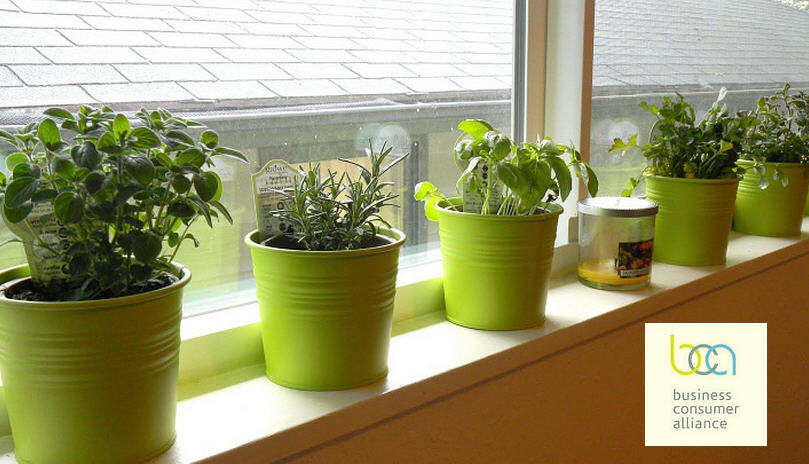Looking for an easy, low maintenance, and inexpensive way to liven up your tried-and-true recipes? You may wish to consider starting an herb garden. It’s simple and can be started right in your windowsill. Here are some simple steps and advice for novice growers seeking to start their own herb garden.

Advantages
Adding simple herbs like basil to a homemade pizza, cilantro to a fresh batch of salsa, or oregano to a savory pot of your favorite soup can really heighten the flavor of your dish. In the store, fresh herbs can cost an average of two dollars or more per bunch. On the other hand, starter plants cost very little and if you maintain them, they are more cost effective and continue to grow as you use them.
Maintenance is fairly simple. Daily watering, proper sunlight, and pruning your herb garden won’t take much time and will produce healthy plants. Maintaining an herb garden means you will always have fresh herbs available to add a fresh burst of flavor to your menu selections. Also, many herbs freeze well, making them handy during months where chill may set in or sunlight isn’t adequate. With your own herb garden, you will still have access to these herbs, even when they’re out of season and hard to find in stores.
Supplies
You don’t have to buy fancy materials in order to start your own herb garden. Seedlings are available at local grocery stores, nurseries, farmers markets, etc. After you have your seedlings, you will need:
-
small pots or planters with drainage holes
-
extra soil for replanting
-
a small shovel or something to dig with
-
plant markers
-
gravel or rocks
An optional item you may want to have on hand is plant food, such as Miracle-Gro, to keep your plants nourished.
Choosing Herbs
There is a wide variety of herbs to choose from. We suggest you keep it simple at the beginning and just start with a few. Some popular herbs to begin with include: basil, chives, oregano, rosemary, parsley, dill, mint, thyme, and sage. To narrow down your choices, think about the meals you make most often and select complimentary herbs to enhance the flavor of your dishes. Pay attention to how much sunlight and water each needs to stay healthy. If in doubt, contact a nursery for growing and maintenance tips.
Planting Herbs
Once you’ve planned on where you want to place your garden (indoors or outdoors), which herbs to plant, and gathered your basic supplies, it’s time to get planting. Fill the bottom of each pot with three-quarter inches of gravel or rocks and fill completely with soil. Dig a hole in the soil large enough for the plant to fit into. Remove the plastic from the seedling and place the plant into the hole. Gently press the soil down around the plant. Use a plant marker to mark each herb so they can easily be identified.
Maintaining and Picking Your Herbs
Make sure the herbs get at least six hours of bright sunlight. Avoid overwatering your plants or not giving them enough water. SkinnyGourmet suggests pruning the herb just above a set of growing leaves, making your first trim approximately three to four inches above the soil in order to produce a nice sturdy plant.
When picking leaves from the plant, select the young tender leaves from the top instead of the larger older leaves found at the bottom. Not only will you get the more flavorful leaves of the plant, but you will avoid making the plant “top heavy” and toppling over because there are no sturdy leaves at the base.
Other Tips
To freeze, chop up fresh herbs and place about a tablespoon or so into ice cube trays. Fill each cube with water or olive oil and freeze. Next time your recipe calls for a particular herb, your herbed ice cubes will be waiting in your freezer, ready to melt into whatever you’re cooking. Your herbs may also be dried as well.
Cut back herbs before they sprout flowers. Doing so encourages your plant to produce more leaves.
If you find you have too many herbs to use, your culinary family, friends, and co-workers will no doubt be happy to share the wealth.
For more useful tips, check out the Herb Gardens 101 blog from Sproutabl.
About the Author:
Nicole Pitts is a Senior Business Analyst and Editor for Business Consumer Alliance. She has been with the organization for 12 years and specializes in report writing, business evaluation, and investigations. Nicole corresponds with businesses regarding complaint trends and provides suggestions to help them alleviate problem areas that may cause concern. She also conducts advertisement reviews, reports on government enforcement actions, and assists government agencies and the media in obtaining information. She enjoys reading, movies, and spending time with her family. Nicole may be reached by email at npitts@businessconsumeralliance.org.